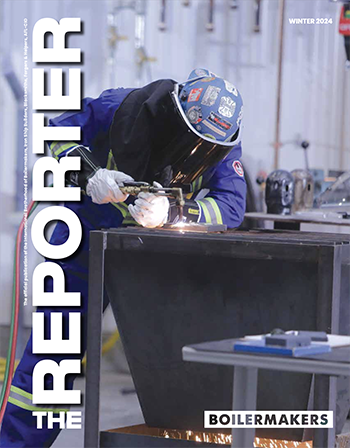Congress and the president can ensure that all Americans have access to health care - will they?
America's health care system is in crisis. That's the word from the street and from the boardrooms as well.
When the Kaiser Family Foundation asked people to rate their greatest personal concern, the cost of health care was number one. Nearly 40 percent of Americans rate health care costs as a bigger worry than the economy, the stock market, the war in Iraq, or the threat of global terrorism.
And they have good reason to worry. Health care insurance premiums have risen at double-digit rates each of the past three years, four or five times as much as wages have increased.
Rising health care costs are the reason our national health and welfare plan has had to make such drastic changes, and that will be a very big issue in our contract negotiations in our shops.
Faced with skyrocketing medical insurance premiums, many employers are increasing deductibles and co-pays, driving up costs for workers.
Many more are trying to drop their employer-provided insurance entirely at a time when their workers can least afford to be without it.
Earlier this year, members of the UFCW engaged in one of the longest strikes in recent years in order to keep their coverage. With unemployment high, workers do not want to go out on strike and risk losing their jobs.
But these grocery workers understood that if they lost their health care insurance, they would be forced to look for other jobs anyway. Health care is a basic need, but without insurance, most people cannot afford it. And nearly all Americans who have health care insurance have it through their employer.
Union members have an advantage in this area - the collective bargaining advantage. That's why 73 percent of union members get health care insurance through their employer, compared to barely 51 percent of nonunion workers. Collective bargaining works.
But collective bargaining alone cannot reverse the trend toward high costs. Collective bargaining only creates contracts between employers and employees. The economic forces behind the rapid rise in health care insurance premiums are another matter altogether.
First, the costs of the average "unit-of-care" is rising at twice the rate of inflation. A unit-of-care can be a visit to the doctor, a bottle of pills, or a surgical procedure. As these units outpace inflation, overall costs go up.
In addition, Americans are using more care than ever before. As treatments become easier to get, more people want them. Procedures that used to require long hospital stays are now done in outpatient facilities and you can be home in a few hours. Last year, overall costs rose eight percent.
You might wonder why insurance premiums rose 15 percent when costs rose only eight. There are two reasons.
First, the 41.2 million Americans with no medical insurance of any kind push up premiums for those of us with insurance. When the uninsured get medical care they can't pay for, those with insurance foot the bill, increasing our premiums even if we don't use our insurance.
Second, with no end to the trend toward rapidly rising unit costs and overall costs, insurance companies must constantly raise their premiums to stay profitable. They must not only collect enough to pay for this year's medical expenses; they must provide for future expenses as well.
Solving the dual problems of rising health care costs and health care insurance premium costs will not be easy. But it can be done.
All it requires is the will to act.
Unfortunately, so far, neither Congress nor the president has been willing to do anything to keep these costs under control. Exactly the opposite.
Congress had an opportunity to slow down prescription drug price increases when they passed the new Medicare bill, with its drug benefit. All they had to do was allow Medicare to use the market power of millions of retirees to negotiate with drug companies for lower prices, like the Veterans Administration does. Like Wal-Mart does.
Instead, Congress specifically prohibited Medicare from negotiating lower prices. And then they made it illegal for Americans to buy drugs from Canada, where the government's price negotiations keep drug prices an average of 40 percent cheaper than here.
The new Medicare bill gave billions of dollars in subsidies to drug firms, hospitals, and insurance companies, yet millions of seniors will actually pay more for their drugs than before.
I have to believe that the nearly $30 million the drug industry donated to federal candidates in the last election influenced some votes.
Bush ran on a platform promising every American access to good medical care they could afford - and each of his state of the union speeches has reiterated that promise - yet the number of uninsured grows daily, and he offers no plan for providing them health care, not now, not ever.
One of the reasons the Boilermakers endorsed Democratic Senator John Kerry for president is that he has a plan for health care reform that would let every American enjoy the same health care that members of Congress enjoy.
The choice between candidates in this year's presidential election is more clear than it has been in a long time.
On issue after issue - not only health care, but also pensions, trade, immigration, the federal budget, tax breaks for moving jobs overseas, allowing corporations to move offshore and avoid taxes, and dozens of others, the Bush administration supports businesses and special interests.
Senator Kerry supports workers. We need to stand up for John Kerry because he stands up for us.
You owe it to yourself, your family, and your fellow union brothers and sisters to get active in this year's campaign. Register to vote. Contribute to pro-worker candidates. Contributing money is important, but you can also give your time. Volunteer to help.
And most important of all, vote for pro-worker candidates on Nov. 2.
The greatest power we have to bring about change is our vote.
Learn more about John Kerry and his vision for America at his campaign Web site: http://www.johnkerry.com/






